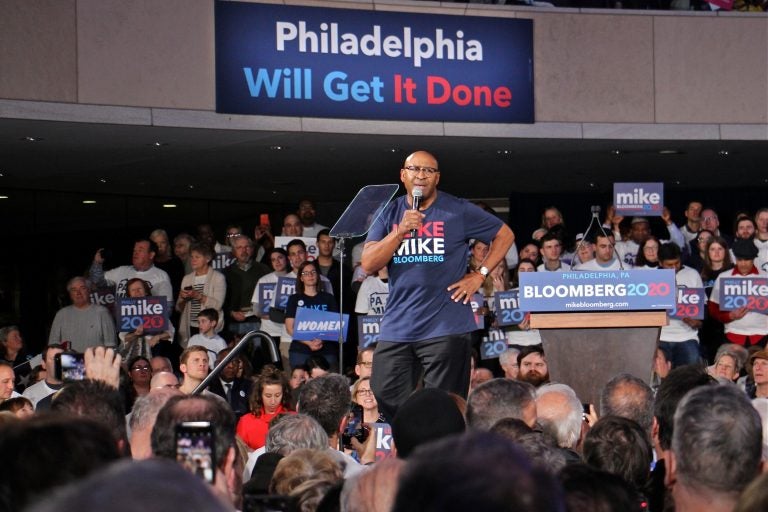Nutter stands by Bloomberg on stop and frisk — and the campaign trail
A look at former Philly Mayor Michael Nutter's new job on the campaign trail — from stumping at rallies to defending his candidate (and himself) amid controversy.
Listen 17:29
Former Philadelphia Mayor Michael Nutter warms up the crowd at the National Constitution Center for Democratic Presidential candidate Michael Bloomberg. (Emma Lee/WHYY)
Listen to The Why wherever you get your podcasts:
Apple Podcasts | Google Podcasts | Stitcher | RadioPublic | TuneIn
Former Philadelphia Mayor Michael Nutter told WHYY’s The Why that he stands by the use of the controversial policing tactic of stop and frisk during his time in office.
“I wanted to focus on getting guns off the street and stop brothers from killing each other,” said Nutter, noting that in 2007, the year before he took office, there were 391 murders in Philadelphia. “That’s slightly more than one a day so I thought we needed to do something.”
Nutter said he apologizes to anyone who was subjected to unconstitutional treatment, in which the officer lacked a reasonable suspicion to stop and pat down the person.
“For anyone who experienced that, anyone who felt that way, anyone who was treated inappropriately during our efforts to try to make communities safer, I would certainly apologize to that person,” he said.
Nutter, who is now serving as National Political Director for Michael Bloomberg’s campaign, has found himself defending the former New York City mayor over comments he made in 2015 about the practice.
In a clip from an appearance at the Aspen Institute, Bloomberg can be heard saying, “95% of your murders and murderers and murder victims fit one M.O. You can just take the description and Xerox it and pass it out to all the cops. They are male minorities 15 to 25.”
In 2015, Black men committed 36% of murders and made up 52% of all murder victims in the U.S.
Bloomberg later added that in the face of gun violence, the solution was to “put all the cops in the minority neighborhoods.”
“Why’d we do it? Because that’s where all the crime is,” he said. “And the way you should get the guns out of the kids’ hands is throw them against the wall and frisk them.”
Since the comments resurfaced on Twitter earlier this week, Bloomberg has faced backlash from both progressive and conservative activists who have called the comments racist.
Nutter and Bloomberg met in 2007, just after Nutter had won the mayoral primary election in Philadelphia and was looking for mentorship from New York City’s top leader. The two bonded over the experience of running a big city, said Philadelphia Magazine reporter David Murrell who spoke to The Why about his recent reporting about Nutter’s role on the presidential campaign trail.
Twelve years later, Nutter urged Bloomberg to run for president, and was tapped to become his national political director. As part of that role, Nutter helped Bloomberg craft the speech in which he apologized for stop and frisk at a Brooklyn church.
Stop and frisk has long been criticized for the ways in which it has disproportionately targeted communities of color in cities across the country. In 2013, a federal court in New York found that the policy systematically violated the civil rights of tens of thousands of mostly Black and Latino men in the city.
During his tenure as mayor of Philadelphia, Nutter supported the policy. During his mayoral campaign in 2007, Nutter called for stop and frisk in high-crime areas to help reduce gun violence in the city.
In 2010, the American Civil Liberties Union of Pennsylvania filed a federal class-action lawsuit, alleging that “thousands of people each year are stopped, frisked, searched, and detained solely on the basis of their race or ethnicity by the Philadelphia Police Department as part of its stop-and-frisk policy.”
The city and the ACLU reached a settlement and consent decree the following year, requiring police officers to have reasonable suspicion without “considerations of race or national origin.”
Also as part of the settlement, Philadelphia police were required to collect and store data on all stop and frisks in the city. They also adopted new training protocols and oversight by the independent Police Advisory Commission.
Eight years later, the city has significantly reduced the number of illegal stops in Philadelphia. The city’s latest report says 16% of a random sample of reported stops made during the first half of 2018 were deemed unlawful, meaning the officer didn’t have reasonable suspicion before making the stop.
Six years earlier, the number of unlawful stops stood at 40%.
Although that drop is considered by the department and some criminal justice reform advocates as a step in the right direction, the issue persists with Philly police disproportionately stopping people of color — particularly young Black men.
The latest report’s sample showed African Americans accounting for 71% of all stops.
WHYY is your source for fact-based, in-depth journalism and information. As a nonprofit organization, we rely on financial support from readers like you. Please give today.






